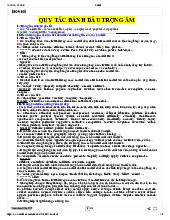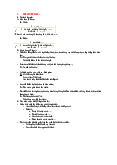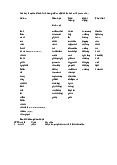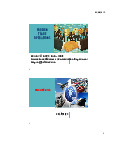

Preview text:
U24: CORPORATE SOCIAL RESPONSIBILITY
1. Discrimination: Treating some people in a worse way than you treat other people
2. Undermining: making something weaker
3. Free enterprise: an economic system in which anyone can raise capital,
from a business, and offer goods or services
4. Conforming to: complying with or following (rules, etc.)
5. Embodied: expressed, given a material form
6. Ethical: according to generally accepted beliefs based on morals
7. Custom: a usual way of behaving
8. Insofar as: to the degree or extent that
9. Harm: cause damage to
10. Proponents: supporters, people who argue in favour of sth U26: EXCHANGE RATES
1. Revalue: to increase the value of a currency in an otherwise fixed system
2. Devalue: to decrease the value of a currency in an otherwise fixed system
3. Floating: adjective describing a rare that changes or varies
4. Proponents: people who argue in favour of sth
5. Depreciate: to fall in value in a market system
6. Appreciate: to rise in value in a market system
7. Hedge: to attempt to protect oneself against future price changes
8. Fluctuations: continuous changes in a price or value
9. Futures contracts: agreements to buy sth at a fixed price several months ahead U27: INTERNATIONAL TRADE Vocab 1
1. Free trade: means imports and exports of goods and services without any government restrictions
2. Protectionism: restricting imports by way of trade barriers such as tariffs and quotas
3. Trade barriers: government polices or regulations that restrict internationla trade
4. Tariff: a tax charged on imports
5. Quota: a maximum quantity of goods of a specific kind that can be imported into a country
6. Absolute advantage: a country's ability to produce goods at a lower cost than any other country
7. Comparative advantage: produce particular goods more efficiently (using
fewer resources and at a lower cost) than some other countries
8. Infant industry: in an early stage of development and which cannot survive competition foreign companies
9. Strategic industry: particularly important to a country's economy Vocab 2
1. Generic: a cheaper copy of a product that is not marked with the producer's name
2. Trademark: a name or a symbol showing that a product is made by a
particular producer and which cannot be legally used by anyone else
3. Dumping: selling unwanted goods very cheaply, usually in other countries
4. Copyright: the legal right to control the production and selling of a book,
play, film, photograph, piece of music, etc
5. Subsidize: to pay part of the cost of sth U28: ECOMOMICS AND ECOLOGY Vocab 1 1. Mean: average
2. Bear: to accept or tolerate or endure sth unpleasant
3. Stemming from: originating or developing as the result of sth
4. Crucial question: an extremely important or necessary thing to ask 5. Discounted: reduced
6. Rate of return (of capital): the amount of income received each year from
an investment, expressed as a percentage of the total amount invested
7. In a nustshell: in summary, briefly or simply
8. Highly cost-effective: producing very good results for the amount of money concerned
9. Poorest / Developing nations: least wealthy countries
10. Poverty line: the minimum level of income necessary to meet basic needs Vocab 2
1. Albeit: although it is
2. At threat: likely to become endangered in the future
3. Decouple: to disconnect or separate
4. Desertification: the process by which land becomes dry and vegetation is destroyed
5. Hindrance: sth which makes it more difficult for sth to happen
6. Inertia: the physical force that keeps sth moving in the same direction
7. Iterative: repetitive or recurring
8. On a par with: at the same level as sth else
9. Political will: strong government intentions
10. Reticence: unwillingness to do sth
11. Timeframe: the period during which sth is projected to take place




